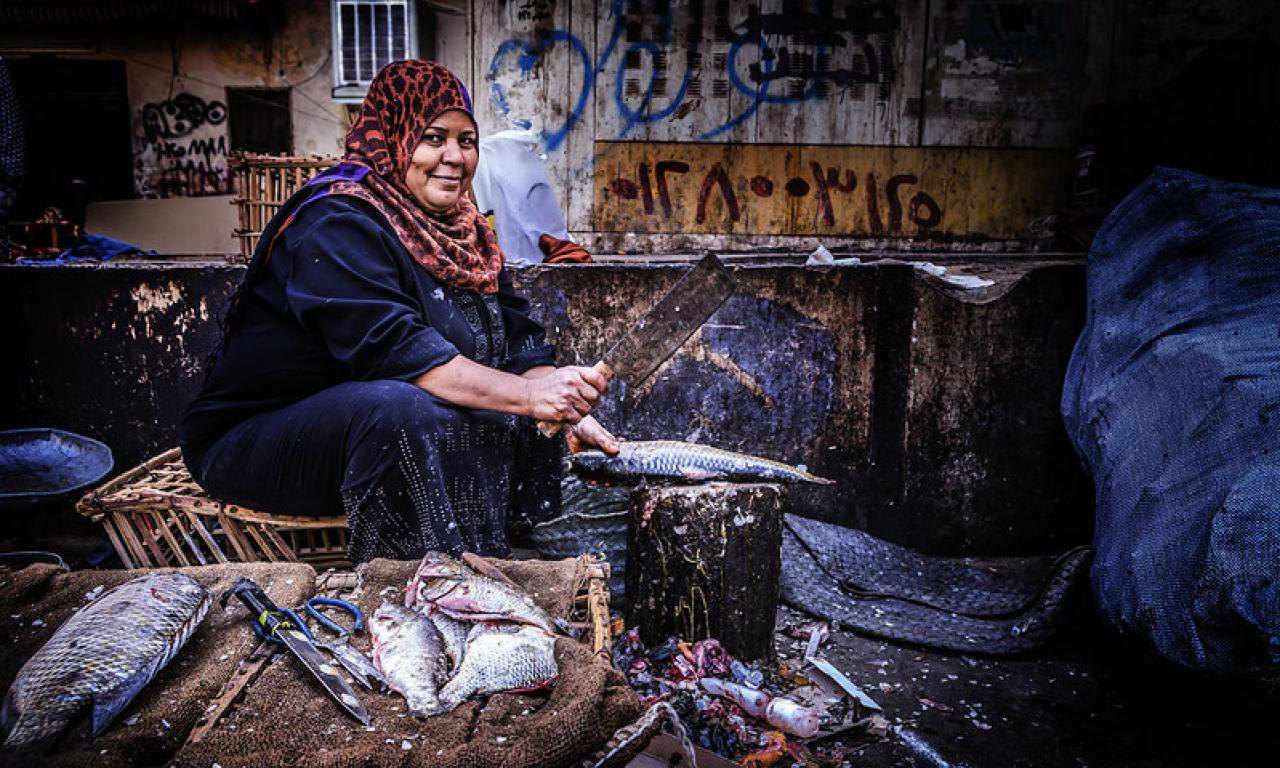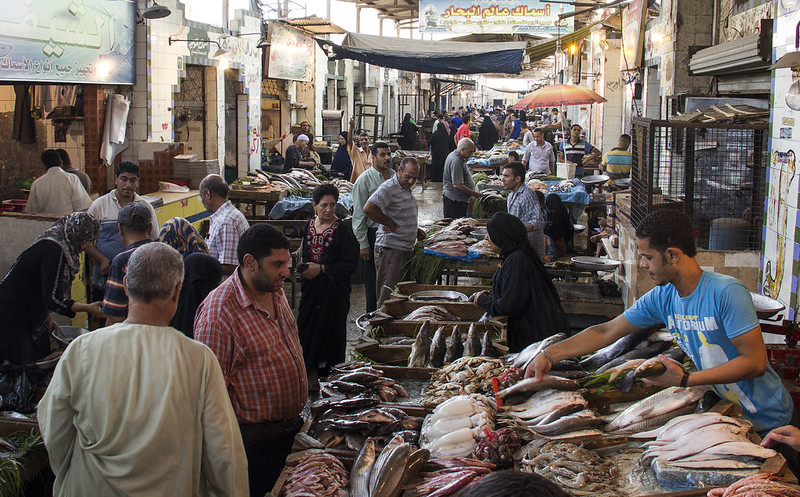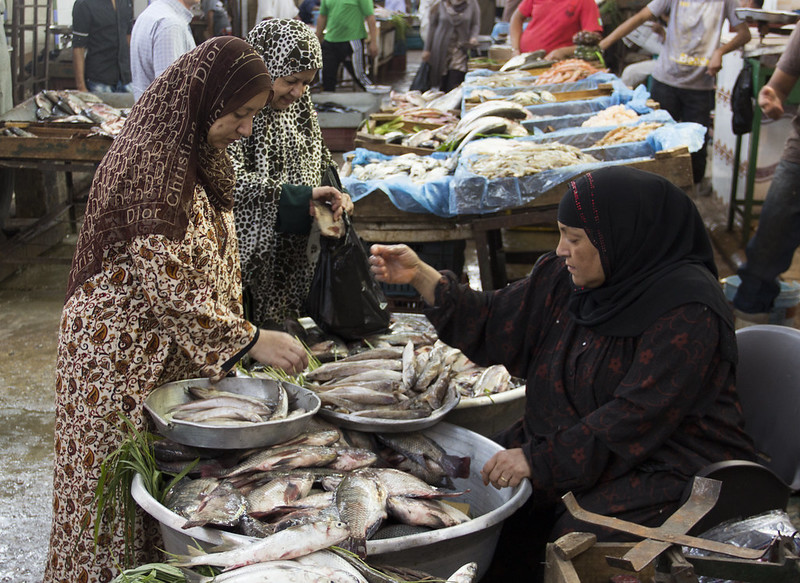
Prospects for change and barriers to success
Unless gender inequalities in food systems are recognized and addressed, nutrition security and poverty reduction will suffer. Yet historically, women have been little recognized in national data, policy, or programming relating to fish value chain development, thus perpetuating inequalities.
Women’s empowerment in Egypt has become even more crucial in the context of the current COVID-19 pandemic that has taken a significant economic toll in Egypt. Social distancing measures established to curb the spread of COVID-19 have particularly affected the operations of informal markets. With governments closing down informal markets or reducing operational hours, the effect is severe for informal workers who earn their livelihood on a day-to-day basis and many poor consumers who rely on street markets/vendors for their daily food and necessities. Women who work in informal trade are at a crossroads where irrespective of their choice to work or stay at home; the consequences are likely negative. If they continue to work in informal trade, they face higher risks of infection for themselves and their household members. If they choose to forego their livelihood, they risk losing their bargaining power and may face higher risks of domestic violence.
A lack of evidence-based understanding of women’s experiences and gender barriers in fish value chains may result in formulating policies and programs intended to help fishers and fish traders recover in the aftermath of COVID-19, being gender-insensitive. As a result, lack of evidence around women fish retailers, may not only leave behind or affect women (in contradiction of the UN Framework), it may also result in the inadequate economic recovery of the fisheries sector as well as the national economy.
Research recently published by WorldFish helps to close this data gap. It shows that women in fish retail in Egypt face greater economic barriers and generate smaller financial returns than do men retailers. This SDC-funded research aimed to examine these gender gaps and offer development programs that help address these imbalances both in the market and in the household.
Key to this study has been a relational perspective, which considered the social relations of actors at multiple scales. While adopting a social relations approach, the study examined the economic significance of gender relations that exist not only in the marketplace but also within the households of women and men retailers. For this framework of investigation, a mixed-methods approach was applied. The framework allowed the study to collect valuable data regarding household relations, decision-making, division of paid and unpaid labor, as well as market exchange and credit relations. The collected data was explored, cross-validated, fitted to an enterprise performance model, and tested against the scale of enterprise, also known as the volume of daily sales.
Gender proved to be a significant predictor of sales, suggesting that men were more likely to sell higher volumes of fish every day. Also, when the sex of the retailer was intersected with gendered constraints, such as household care and time spent in retail, these interaction terms produced significant effects on daily sales. Another significant indication that these constraints are very different for men and women.

The model also observed a significant effect of supplier agreement to enterprise scale. While labor and exchange markets are often considered as free spaces of trade where buyers and sellers carry out business in a neutral manner, the reality of Egyptian fish is evidently different. Findings suggested that women experienced more restrictive and less reliable supply and credit contracts than men retailers did. Coupled with cultural norms around women’s visibility in the public sphere, Egyptian women retailers have fewer options for purchasing inputs or selling goods. Further research is needed to effectively document these social dynamics that are otherwise unspoken but economically important.
Moreover, supply constraints that are more severe among women in informal fish retail may be elevated under the COVID-19 ban, which has disrupted the fisheries value chains. Women in informal fish retail not only face health risks and restrictions on their operations, but they may also face uneven supply and demand.
The economic link between gender relations in the household and marketplace can often be overlooked. However, as the model suggested, household gender relations and labor supply are significant to retailing operations. The interaction of gender with household labor produced a considerable effect on daily volumes of fish sold, suggesting that the availability of household help was more important for women retailers than men retailers. As would be expected, more time spent in the market led to increased sales. Yet, analysis of variance found such time availability was heavily gendered, where women retailers were time-poor, and men retailers were time-rich in the market.

In Egypt, where household labor roles and relations are heavily gendered, and where freedom of mobility plays an essential part in the daily hours of paid and unpaid labor, significant market constraints exist both within the household domain and throughout the marketplace. Previous studies have shown that aquaculture markets have provided a beacon of hope for the economic development in Egypt by enabling significant employment opportunities in urban retail sectors; however, such benefits have tended to be unevenly spread between men and women retailers. One of the key challenges to ensuring more gender-responsive development is the lack of sex-disaggregated data and gender-sensitive literature on fish markets in the Middle East. The opportunity remains, therefore, for future research to investigate these otherwise veiled domains of economic activity and competition, in ways that can provide accurate and actionable perspectives to policymakers who are looking to exploit the already remarkable development of Egypt’s aquaculture markets.
Authors: Diksha Arora, Froukje Kruijssen, Cynthia McDougall, Seamus Murphy.
Related articles:
-
Employment generation in the Egyptian aquaculture value chain: implications for meeting the Sustainable Development Goals (SDGs)
- Gender and aquaculture value chains: A review of key issues and implications for research
- Improving the livelihoods and wellbeing of women fish retailers: Success stories from the STREAMS project in Egypt
-
Selective breeding trait preferences for farmed tilapia among low-income women and men consumers in Egypt: Implications for pro-poor and gender-responsive fish breeding programmes
Related projects:
- Empowering Women Fish Retailers in Egypt (EWFIRE) Project